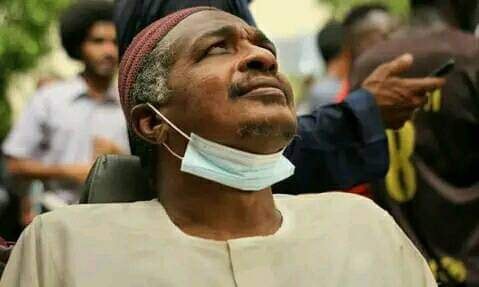Sudanese in El Gedaref are arming themselves ‘despite hate of Islamists’

Teacher and civil society activist Jaafar Khidir (File photo: Supplied)
People in El Gedaref in eastern Sudan are still bracing for a possible attack of the Rapid Support Forces (RSF). Calls for popular resistance are finding wide response,” civil society activist Jaafar Khidir reported yesterday.
Following the RSF invasion of neighbouring El Gezira, after only four days of resistance by the Sudan Armed Forces (SAF), in December, triggered fears among the residents of El Gedaref about a possible breakthrough of the paramilitaries to the East.
“Calls for popular resistance and the arming of civilians have now also penetrated the countryside and found a wide response, also among those who never belonged to the former Al Bashir regime,” civil society activist Jaafar Khidir told Radio Dabanga.
“The Sudanese army entrusted the process of arming civilians in El Gedaref to former members of the Popular Defence Forces (PDF*), popularly known as the kezan** militia,” he explicated.
“They are headed by hardliners of the Islamist movement, former El Gedaref Governor El Daw El Mahi and Mohamed El Sunni, who served as a minister in the Al Bashir regime, in addition to a number of other well-known names.
“This caused quite some people to reject the calls for civilian armament, as that they categorically opposed the Al Bashir’s [dissolved] National Congress Party, like the rest of the Sudanese,” Khidir continued.
“But the threat of the RSF taking over El Gedaref as happened in El Gezira after the army withdrew, remains, so people want to be able to defend themselves to protect their villages,” he said. “So, despite the hate of the Islamist elements, popular armament is proceeding at an increasing pace.”
The activist explained that the residents of El Gedaref “can roughly be divided into three groups according to their positions: “those who prefer to stay to face their fate without arming themselves, others who joined or will join the popular resistance, while the third group decided to seek refuge in other places in eastern Sudan. Large numbers already left the state immediately after the RSF took control of El Gezira.”
Khidir, who is physically impaired, has been detained several times during the reign of dictator Omar Al Bashir (1989-2019). In July last year, he was held for 24 hours in connection with three complaints under the cybercrime law, following posts on social media in which he expressed surprise that prominent members of the Al Bashir regime, like Ahmed Haroun, were allowed to organise activities in El Gedaref, while those who publicly rejected the war were persecuted.
‘Plenty of firearms‘
On the first day of this year, Beja leader El Amin Shangerai warned about “the extremely fragile security situation” in eastern Sudan (El Gedaref, Kassala, and Red Sea state).
“There are security threats that may cause the situation to burst, one of them being the presence of a large number of leaders of the Al Bashir regime in the region, who are mobilising the eastern Sudanese to fight alongside the army,” he told Radio Dabanga.
Shangerai further said that he is also “extremely worried about the emergence of separatist tendencies among the people of eastern Sudan”.
Small Arms Survey researcher Khristopher Carlson reported in May last year that Sudan is awash with firearms. “The country ranks second among its regional neighbours in total firearms estimates, with combined holdings among civilians and security forces topping out at over three million.”
In July last year, Radio Dabanga reported that the SAF was progressing with its mobilisation efforts by establishing Pride and Dignity military training camps in eastern and northern Sudan in which volunteers received basic military training.
* The paramilitary Popular Defence Forces (PDF) was established after Omar Al Bashir’ took power in a military coup in June 1989. Its members received training, uniforms, weapons, and food, but no salaries. The PDF not only operated as a reserve force for the Sudan Armed Forces (SAF) but also played a major role in the distribution of weapons to, and military training for, tribal militias. After the ousting of President Al Bashir in April 2019, the PDF remained operational, in particular in South Kordofan, until early June 2020, when the militia was officially dissolved.
** The word kezan, or kizan, is a pejorative nickname used by many Sudanese for Islamist loyalists to the regime of Omar Al Bashir (1989-2019) and who enjoyed far-fetching privileges during his rule. Kezan is the plural of koz which means ‘wooden or iron mug’. The nickname is based on a description the Islamic Brotherhood called themselves when the founder of the group, the Egyptian Hasan El Banna, said: “Religion is a sea, and we are the mugs that draw from it”.











 and then
and then